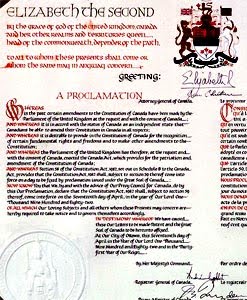
Canadian citizens have rights and responsibilities. These come to us from our history, are secured by Canadian law, and reflect our shared traditions, identity and values.
Canadian law has several sources, including laws passed by Parliament and the provincial legislatures, English common law, the civil code of France, and the unwritten constitution that we have inherited from Great Britain.
Together, these secure for Canadians an 800-year-old tradition of ordered liberty, which dates back to the signing of Magna Carta in 1215 in England (also known as the Great Charter of Freedoms), including:
- Freedom of conscience and religion;
- Freedom of thought, belief, opinion and expression, including freedom of speech and of the press;
- Freedom of peaceful assembly; and
- Freedom of association.
Habeas corpus, the right to challenge unlawful detention by the state, comes from English common law.
The Constitution of Canada was amended in 1982 to entrench the Canadian Charter of Rights and Freedoms, which begins with the words, "Whereas Canada is founded upon principles that recognize the supremacy of God and the rule of law." This phrase underlines the importance of religious traditions to Canadian society and the dignity and worth of the human person.
No comments:
Post a Comment